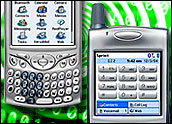
Nokia is hoping its new short-range wireless technology unveiled Tuesday will become the industry standard for small device applications. The new technology, dubbed “Wibree,” uses less power than Bluetooth and works in smaller devices such as watches and toys.
Wibree can integrate with Bluetooth, and like Bluetooth, communicates via radio at a distance of up to 30 feet. Wibree is more energy-efficient than Bluetooth, however, and will be cheaper to implement, according to Nokia. Wibree is so small, it could be used within intelligent clothing and jewelry such as wristwatches.
Enormous Pressure
Nokia is now set to put Wibree through the standardization process. This process involves politics as much as it does technology, however, and that may be a catching point. “The bottom line is, it’s just another standard in a huge number of standards,” said Ben Wood, director of clients at Collins Consulting.
“It’s overwhelming, the kind of resources required to keep on top of all these things,” he said, and cautioned that while Nokia, the largest cell phone manufacturer, may have the muscle in the cell phone sector, Wibree crosses over into consumer goods, where the company has less power.
The industry “is under enormous pressure from the perspective of margins in particular, so having to spare resources to invest in new technologies is a little bit of a challenge,” Wood said. “I’m convinced a technology along these lines will be adopted,” Wood said. “Whether this is the one remains to be seen.”
Wood also suggested that the name “Wibree” is confusing because of its similarity to both WiFi and ZigBee, a competitor to Bluetooth. “If they had called it ‘Bluetooth Light’ I think people would have gotten it a lot better,” he said.
Broadcom, CSR, Epson, Nordic Semiconductor, Taiyo Yuden and Suunto are the companies working with Nokia to define the standard. Suunto manufactures high-end, high-tech watches and extreme sports accessories, and that firm’s involvement in Nokia’s Wibree project “is a leading indicator as to where it could go,” Wood said.
Commercial Availability
If approved, Finland-based Nokia expects the standard to become commercially available in the second quarter of 2007, with products to follow soon after. Nordic Semiconductor said it will ship Wibree chips in the second half of 2007.
Two different chips will be available. For devices with an existing Bluetooth connection, there will be a dual Bluetooth-Wibree chip, and for devices without an existing Bluetooth connection, there will be a Wibree-only chip. Bluetooth is an open industry standard; Wibree is also an open initiative.
Last month Fossil unveiled the Caller ID wristwatch, a Bluetooth-compatible watch that links to cell phones. Wibree would enable similar products.











































